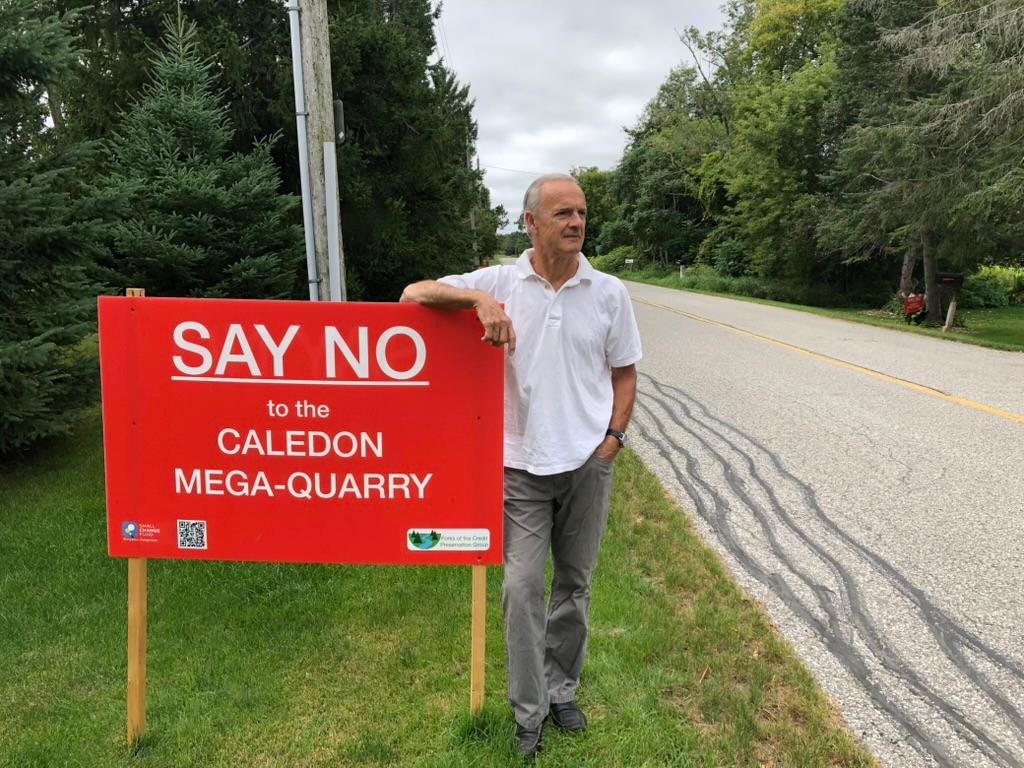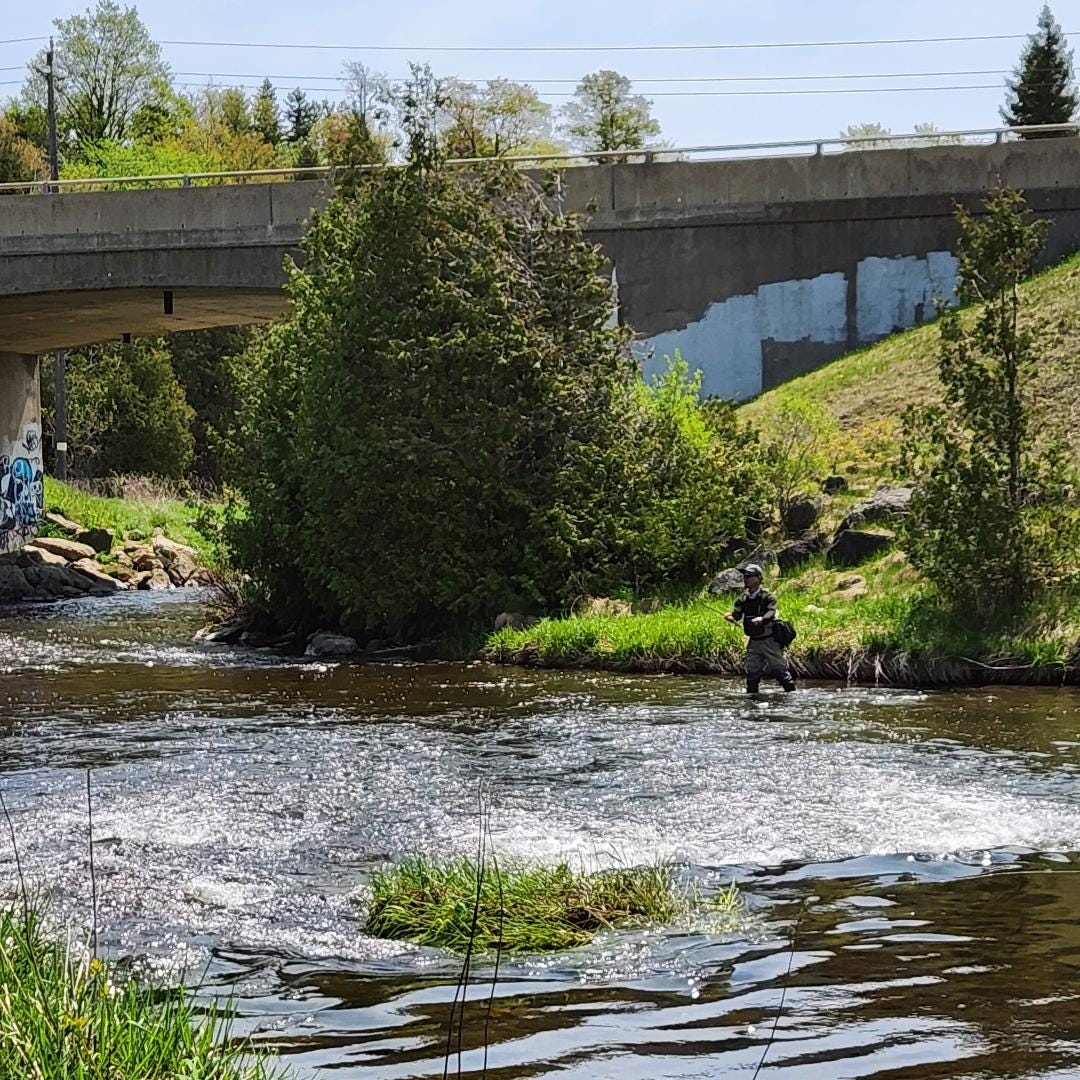Photo: David Sylvester, Chair of Forks of the Credit Preservation Group Credit: David Sylvester
In 2021, I wrote an article for rabble.ca titled, Why Does Doug For Hate Caledon? In it I discuss the fact that Ford wants to run proposed highway 413 through Caledon literally cutting the town in half.
Ford also approved two warehouses, a gravel pit and a mega quarry on prime farmland and greenbelt lands that sit at the headwaters of the Credit and Humber rivers.
And, as if that was not enough, Ford has proposed putting a municipal waste water management plant on the Credit River near the spawning grounds of native Brooke trout. Those spawning grounds are also immediately adjacent to the proposed quarry site and blasting from the quarry could devastate this trout species which draws tourists and fly fishers from around the globe.
Photo: Fly fishing for Brooke trout in the Credit River Credit: Forks of the Credit Preservation Group
Essentially, Ford is transforming Caledon into a veritable wasteland by expanding aggregate extraction, constructing warehouses and highways while exponentially increasing truck congestion.
Join me today as I speak with David Sylvester, Chair of the Forks of the Credit Preservation Group (FCPG).
David was born and raised in Bowmanville, Ontario. After attending McMaster University, Western University and the University of Illinois in Chicago, David settled in Caledon with his wife, Anne, where they raised their four children while enjoying biking, hiking and gardening.
Over the past five years, the retired orthodontist has devoted his time to learning more about aggregate extraction and licencing. What David unearthed prompted him to act in the best interests of current and future generations.
Photo: Approximately 600 acres of the proposed quarry site is prime agricultural land Credit: Forks of the Credit Preservation Group
Aggregate is an important building material for major projects and infrastructure. That’s why Ontario produces 165 million metric tonnes of aggregate annually.
But under the Ford government, gravel mining has become a free for all with authorized annual extraction limits producing over 13 times that amount. Meanwhile, Ford continues issuing new licenses that consume approximately 2,023 hectares/5,000 acres of land annually.
In fact, Ontario’s Provincial Policy Statement (PPS) around land use management states, “There’s no need to show need for a new pit or quarry. As much gravel shall be made available as possible and no discussion of whether it’s needed or not shall be allowed.”
The gravel mining industry is also licensed to take up to 4.6 billion litres of water daily for extraction processes.
In December 2023, the Ontario Auditor General report stated the industry is not managed adequately and that Ontarians can expect violations that will likely to be unpublished by the Ford government.
That means that while we are in the middle of a climate crisis and ground water is under threat from drought as well as corporate extraction for both gravel mining and bottling, the Ford government is not enforcing established aggregate regulations that reflect sound ecological practices.
Additionally, gravel mining increases truck traffic on local roads, affects air quality, generates noise, poses threats to groundwater and causes vibrations that damage homes.
Yet, single-family homeowners often pay more in property taxes than a 40.5-hectares/100-acre commercial gravel mine.
Even when a licence is granted, many quarry operators have made it clear they will only extract half of the licenced rate.
Reform Gravel Mining Coalition created resource materials for folks to ask local municipalities to support a moratorium on new gravel mining approvals in Ontario.
Demand A Moratorium Now – or the DAMN campaign – launched in 2022 was intended to give Ontario gravel mining communities a strong and united voice in the fight to bring 20th century aggregate regulations in line with ecological-consciousness.
Caledon was one of 20 municipalities to support this moratorium and to call for among other things an audit of how many currently licenced quarry pits and mines are active, how many are dormant and how much aggregate is left. Currently, aggregate companies are self-reporting and that hasn’t been working out so well.
Ontario Green Party Leader and MPP, Mike Schreiner, took an additional step by introducing Bill 111, No More Pits or Quarries in the Greenbelt Act, 2023 which passed its first reading in May 2023.
However, in 2023, CBM, a subsidiary of Votorantim Cimentos a Brazilian aggregate multinational, proposed a 324 hectares/800-acre blasting quarry within Caledon.
Satellite imagery map depicting the "Caledon Moonscape" in the northwest part of the municipality created by established and proposed quarries. Credit: Forks of the Credit Preservation Group
David and I discuss the biggest challenge facing FCPG’s anti-quarry campaign as well as the challenges municipalities face when restoring depleted quarry lands to public recreational spaces.
We also discuss what comes next for FCPG — once it succeeds in having the mega-quarry application denied. And, of course, steps Small Change listeners can take to enhance and improve environmental safeguards.
For more information watch webinar: "How Caledon Reformed Gravel Mining, & Your Municipality Can Too" featuring:
David Sylvester (FCPG) sharing how residents worked together with Caledon’s Mayor and Councillors to pass groundbreaking gravel mining reforms, which go beyond provincial regulations to provide stronger protections for community health and climate resilience.
FCPG lawyer David Donnelly explains the legal strategy and provincial significance of the reforms.
James Seeley, Mayor of Puslinch and Chair of Top Aggregate Producing Municipalities of Ontario (TAPMO), discusses the many challenges gravel mining presents for municipalities, and makes a call for municipal leaders to follow Caledon's example and "take a leadership role in regulating this industry."
Download a fact sheet debunking aggregate industry myths on supply and demand and share what you learn with others in your community.
Download The High Road: A Municipal Action Plan to Win a New Standard for Gravel Mining in Ontario, a handbook for residents who wish to engage their local Councillors in elevating gravel mining policy to the level of best practices.
Take action by:
Sending a letter demanding that Sylvia Jones, Dufferin-Caledon MPP, ask the Ontario government to designate the proposed Votorantim quarry proposal for an Environmental Assessment.
Also send a letter asking MPP Sylvia Jones to support Caledon’s new aggregate bylaws.
Thanks to everyone who read today’s article and listened to my podcast. With your continued support, a little Nicoll can make a lot of change.
Music: Real Estate by UNIVERSFIELD is licensed under a Attribution 4.0 International License. freemusicarchive.org.
*Be sure to download the Substack app to get the most from your podcast experience.














